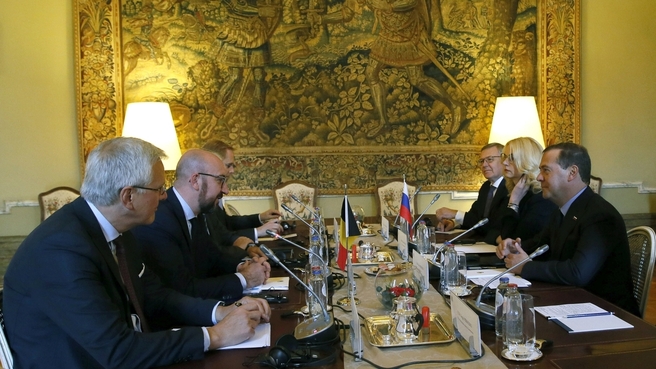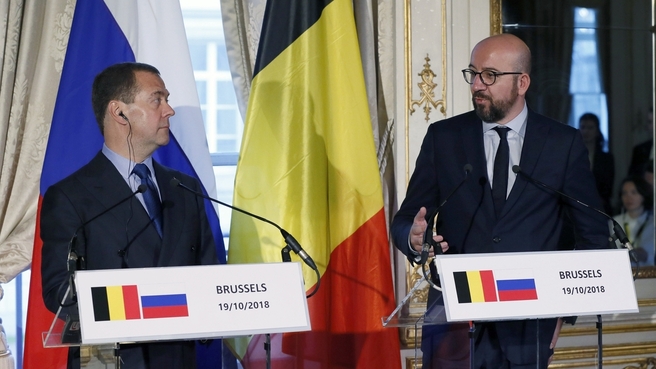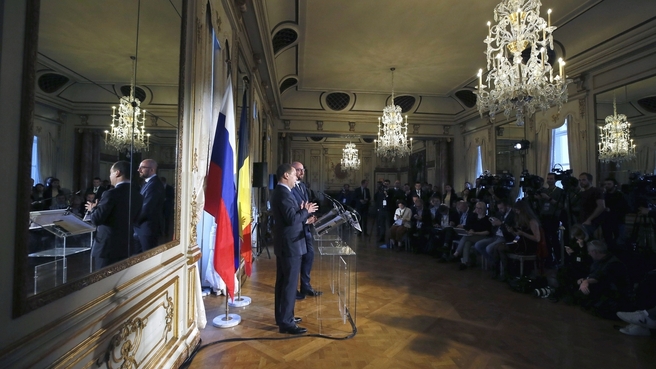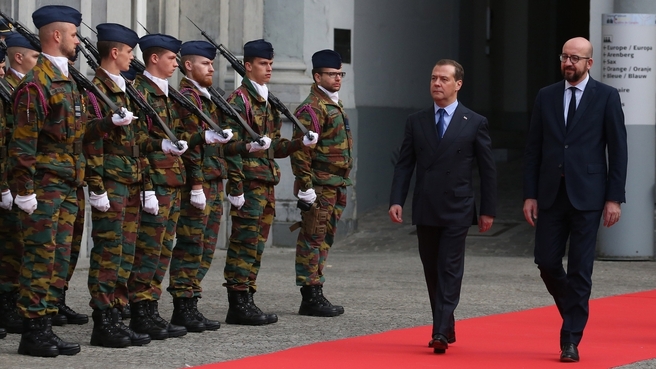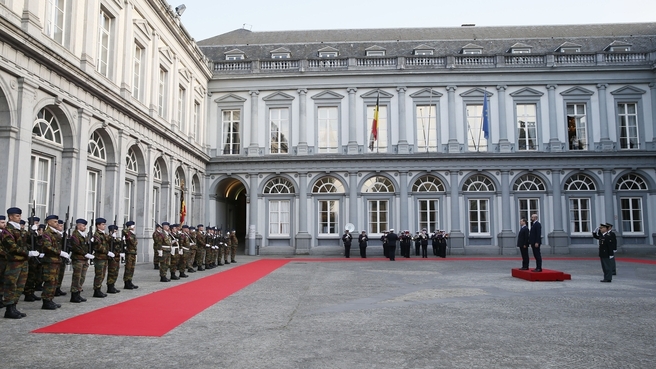Dmitry Medvedev held talks with Prime Minister of Belgium Charles Michel.
Dmitry Medvedev’s meets with Prime Minister of Belgium Charles Michel
News conference by Dmitry Medvedev and Charles Michel following talks
Dmitry Medvedev’s meets with Prime Minister of Belgium Charles Michel
Russian-Belgian talks
News conference by Dmitry Medvedev and Charles Michel following talks
Charles Michel (via interpreter): Good afternoon,
I had an opportunity to hold a working meeting with Prime Minister Medvedev today. He came with a delegation, including, in particular, the Minister of Economic Development.
We discussed Belgium-Russia relations. We met in Russia in January to discuss opportunities in investment and economic activities in order to expand our cooperation. Many Belgian companies interact with their Russian partners. Some of them have been in business for a long time now and are successfully operating, developing the infrastructure, engaging in the mining business and working in the chemical industry. So, the relations between our countries have a long track record, and we must do our best to give a new impetus to bilateral trade.
We also had an opportunity to review international affairs and geopolitical issues. Belgium will become a non-permanent member of the Security Council in January 2019, and we will thus be able to work closely in this organisation with all its members, including Russia. We agreed that we will hold regular consultations. In particular, our delegation will visit Russia in the near future to discuss cooperation in the Security Council and interaction with our various partners.
We also discussed the future of relations between the European Union and Russia. We are fully aware of the fact that a number of issues have caused disagreements between the European Union and Russia over the past few years, and my colleague and I discussed these issues. Acting in line with the Harmel Doctrine, Belgium is trying to find points of contact in order to prevent the escalation of current processes.
Other subjects were covered during the working meeting as well.
Mr Prime Minister, I am very pleased that we were able to openly share our points of view. Everyone has to protect their vision and values. Human rights and the rule of law are the most important values for Europeans. You can count on us as we will always be candid and open in our desire to continue a dialogue and cooperation in various areas, bilateral or multilateral, when we work with you, in particular, on international platforms.
Dmitry Medvedev: Thank you very much.
Mr Prime Minister, media members,
I find it difficult to add anything to what my colleague just said. Indeed, we went over the entire range of economic cooperation between our countries and political interaction, both in the bilateral format and in terms of Russia-EU relations. We pinpointed all the difficulties, all the missed opportunities. Most notably, we discussed our future plans.
Like Belgium, Russia is open to this kind of interaction. I am very pleased that our dialogue, which began in January, quickly found a continuation here, in Belgium. On one hand, I am here because of the ASEM Summit; on the other, I received an invitation to visit Belgium, for which I thank the Prime Minister.
Indeed, we had a very productive dialogue in a friendly atmosphere. We exchanged views on a wide range of bilateral, multilateral, economic, political and security issues.
We welcome the fact that Belgium will soon become a non-permanent Security Council member. This will give us an opportunity to communicate in the UN Security Council as well. We believe that the UN remains the only universal international institution that can take up and resolve issues, because other institutions do not include all international community members. We appreciate Belgium’s contribution to promoting relations with all countries (including ours) and its attempts to find solutions to challenges on the international agenda and in bilateral relations.
We have discussed a number of specific matters. If you have questions, go ahead and ask them now.
Question (via interpreter): Belgian Radio and Television.
Mr Medvedev, when our Prime Minister visited Moscow a few months ago, you said that Belgium could play an important role in restoring relations between the Russian Federation and the European Union. However, a lot has happened since that time, including the Skripal poisoning and a cyber-attack attempt in the Hague. Do you think that normal relations can still be restored, and that Belgium is also ready to pursue this?
Dmitry Medvedev: First, I believe this question should be addressed to my Belgian colleague, not me.
Second, a lot of things happen in the world. They should not necessarily affect our relations.
I can give you examples of things that happen in the world but that do not interfere with our relations.
If our partners are willing to help Russia restore and develop its ties with the European Union, we would only appreciate it. Especially, since we think our relations are going through a rough patch, and we have lost a lot in recent years. I have repeatedly spoken of this. We have lost half of our trade volume, and this trade has been transferred to other countries. In the process of restoring our contacts in different areas, including the economy and political cooperation (which is of great significance, and this ASEM summit shows this), an important role belongs to those countries who would like to participate. And our partners in Belgium have expressed their interest in this.
And this is natural because our relations – the diplomatic relations alone – are 160 years old this year. We have a rich experience of relations and contacts on the most difficult matters, even those on which we differ and which we may dispute. Nevertheless, it is highly important to open channels for contacts in this regard. I believe that Belgium is coping well with this role.
Charles Michel (via interpreter): I would like to confirm that Belgium’s years-long diplomatic strategy is to maintain channels for dialogue as well as channels for interaction and including at the top level. We think that mutual understanding – even on topics, on which we at first are likely to disagree, on which we may have different points of view – is the best approach if the aim is to avoid the souring of our relations. So, mutual dialogue is the path that will help us to reduce tension, if there is tension and to find opportunities for advancing towards solutions.
We were interacting well in January. We discussed all topics openly, frankly and directly to enable everyone to state his position, understand that of the other, and, of course, realise what differences we have on various matters.
Question: Galina Dudina, Kommersant newspaper. I have a question I would like to ask both prime ministers. Belgium is Russia’s long-standing partner in the field of pipeline gas and now LNG. Today, this topic is highly politicised. This is why I would like to ask, if you have discussed any joint projects to supply and distribute Russian LNG via Belgium? Mr Prime Minister, in your opinion, can this gas compete with US LNG?
Dmitry Medvedev: The thing is, this project does exist within the framework of the interaction that our companies engage in. I mean interaction on LNG that is supplied by Yamal LNG and has a distribution centre in Zeebrugge, Belgium. This is why I think that we are already working in this sphere.
As to whether LNG is an alternative, say, to pipeline gas, this is a much more complicated matter. The thing is – and you are quite right in saying so – that recently this subject has been highly politicised, although not due to the efforts of Russia or Belgium. Let us be quite frank, the primary source of these efforts is the United States of America which is constantly wagging its finger at our European partners and saying: Don’t buy gas from Russians! Why not? Because we, Americans, have LNG of our own and we are ready to supply it to Europe for you to be less dependent on the Russian Federation. They are asked: how much? They reply: we’ll discuss this separately; we’ll have to build hubs and storage facilities and generally we’ll offer you market prices.
We, all of us, know all too well that any gas to be supplied from the United States will be 40 percent or so more expensive than the gas supplied from the Russian Federation by reason of logistics pure and simple. I mean both pipeline gas and LNG. Therefore, attacking Russian natural gas in Europe is an example of unfair economic rivalry couched in the verbiage of political concern for European partners. I think that this is just ugly and wrong. We are nurturing no underhand plans in respect of Europe. All of us know that Russia (and the Soviet Union before it) has supplied gas to Western Europe for 50 years and this only strengthens Europe’s energy security and helps Europe develop. Moreover, gas consumption is growing and not because we have closed some other channels. No, the reason is that the European countries are growing.
Therefore, I am confident that Russia-EU and Russia-Belgium energy cooperation has great prospects in the future. I hope that all of us live long enough to see this future.
Charles Michel: Of course, energy sources are an important topic for many countries and even regions of the world. We have not discussed any specific matters, since this conversation will continue, as we have not completed our meeting yet. It is naturally one of the highlights of the strategic dialogue between our partners within the European Union, as well as between the European Union and other countries. This is my answer to this question.
Question (via interpreter): You have recently said that sanctions imposed by Europe result from Europe’s internal developments. Could you tell us whether anyone in Russia questions the decisions you took earlier? Are you ready to do anything in order for the sanctions to be eased, if not lifted altogether?
Dmitry Medvedev: This is what I would like to say about sanctions.
The first thing is that all these sanctions are not a matter of life and death for us. That’s number one.
The second point is that we were not the ones who imposed these sanctions, which means that we are not the ones who can lift them. If our European partners wish to lift any of the sanctions, they can do so; if not, we will live under sanctions.
Let me remind you that the Soviet Union, being Russia’s predecessor in legal terms, lived under sanctions for decades, and was fine with it. Of course, there is nothing good about it. Sanctions have a chilling effect on economic growth, but not only and not so much for the Russian Federation, even though we are of course also affected by the sanctions, as for the European Union. These sanctions are damaging for everyone. To give you an example, the Prime Minister and I have just been discussing agriculture. A number of cooperation opportunities between Russia and Belgium have been blocked due to the sanctions and our retaliatory restrictive measures. There are calculations that the European Union has lost a total of some 100 billion euros.
For this reason, moving away from sanctions would be mutually beneficial. We will not seek to persuade our partners or beg them to lift anything. We do not require them to do such a thing. Our European colleagues must come up with this initiative, if they need to. This would help improve our business ties as well as the overall political landscape on the European continent. This is the way I see it.
As for the changes that we or our European partners must enact, this is what dialogue is all about. This covers all possible questions, including the most urgent and controversial ones on today’s agenda. We know all these questions. They include the developments in Europe and the Middle East, and a number of other matters. We are always open to cooperation of this kind.
Charles Michel (via interpreter): A decision on international sanctions always results in a fiasco for political dialogue. Belgium has always been of the opinion that the imposition of sanctions cannot be an end in itself. This is why we have always realised that a decision on sanctions should be accompanied with in-depth political dialogue in order to find ways of managing the political conflicts between us and to arrive at solutions. We have consistently adhered to this stance both in Belgium and the EU. Quite likely, we are one of the most active European countries calling for dialogue with Russia so as to assess all challenges, possibilities and details related to the relevant topics, which will enable us to find a creative approach towards achieving peace and finding a solution. Of course, we always went along with the decisions on sanctions, but we have always consistently and persistently favoured dialogue.
Let me add that we have always supported top-level dialogue, and not only between Russia and Belgium but also between the EU and Belgium. The European Union should maintain this top-level dialogue with Russia.
Question: Interfax Agency. My question is to Mr Medvedev. Please, tell us about the outcome of the forum. You held several bilateral meetings on the sidelines, specifically with Angela Merkel. Could you say what topics were addressed? Did you discuss Nord Stream 2? Is there any certainty that the project will be implemented?
Dmitry Medvedev: The outcome of the forum is reflected in the declarations; I will not repeat them. In my opinion, the forum was interesting. In some respects – again in my opinion – it was even more interesting and pithy than similar forums I had attended before. For this, I would like to thank both the organisers and our Belgian friends. Speaking about the bilateral format and bilateral contacts, any forum always affords an opportunity to meet with colleagues on the sidelines. Often these contacts are no less valuable – and possibly even more valuable with regard to certain issues – than the actual outcome of the forum. Moreover, to speak frankly, these contacts take place not only on the sidelines but also throughout the forum, including at such pleasant events as the formal dinner or during some other events offered by the organisers.
In fact, I had rather numerous meetings apart from the major talks with my counterpart, Belgian Prime Minister Charles Michel. I had meetings with many of my colleagues. Let me mention some of them.
Yesterday, I had a brief conversation with President of the European Commission Mr Juncker. I told him what is already well known to our partners, focusing on the fact that the current relations between Russia and the EU have absolutely deteriorated. For several years now, there have been no relations, let alone summits, between the European Commission and the Government of the Russian Federation. Ministerial relations are also complicated to a considerable extent. And the outcome of all this is anything but good. We cannot discuss the most difficult issues of the present time. And yet, let me repeat once again, these relations are of particular value to both our country and the European Union.
Let me remind you that even in a situation where Russian-EU trade has plummeted by almost 50 percent the EU remains our biggest partner. On the other hand, the Russian Federation is the fourth most important partner for the EU as a whole - not the last in the line, to put it mildly. I drew their attention to these points. Let us hope that sooner or later we will find common ground and be able to change this kind of relationship.
I had a conversation with Federal Chancellor Angela Merkel, as is usual at such forums. This happened in Ulan-Bator and here in Brussels, Belgium. We discussed various matters. Let me be frank, we discussed both Nord Stream and all kinds of statements regarding Nord Stream that are made overseas. But I already answered this question when I was specifying what kind of gas relations we would consider it right to develop with European partners. I said practically the same thing to Ms Merkel.
We also discussed a number of other details, including the development of industrial cooperation and cooperation between German and Russian companies.
I held meetings with other colleagues, including with Prime Minister of Slovenia Marjan Šarec, with whom I discussed our bilateral business relations with Slovenia. There are many bilateral projects, including pharmaceutical projects.
I discussed Nordic cooperation, matters related to the law of the sea and environmental protection with Prime Minister of Norway Erna Solberg.
I had conversations with some other colleagues, such as Prime Minister of Bulgaria Boyko Borissov. I also met with Prime Minister of Cambodia Hun Sen, whose country, incidentally, will host the next ASEM summit. There were also a number of other working contacts, as they say.
In this sense, I had a packed agenda. I hope we will be able to advance
some issues, both specific and general, as a result. So, I think it was useful.
